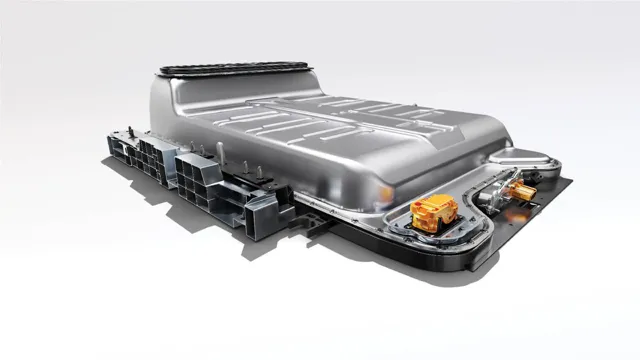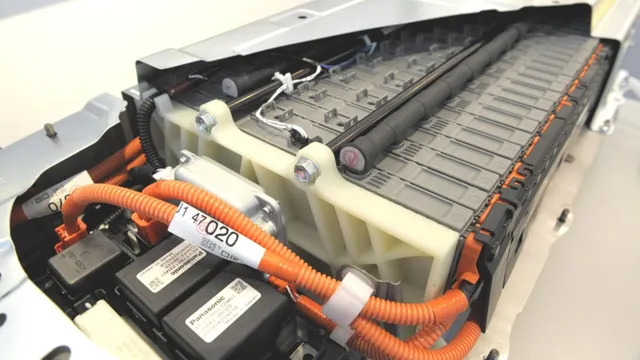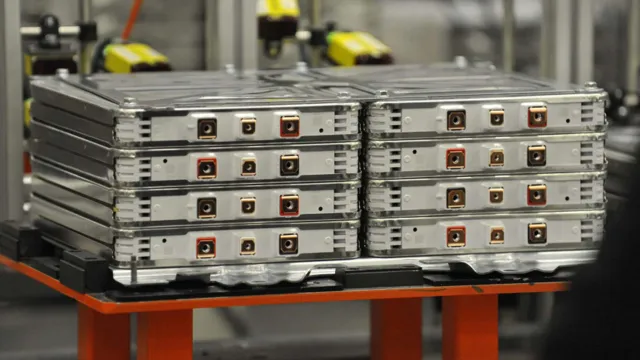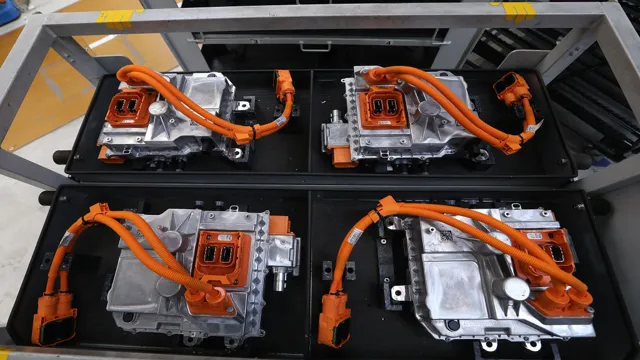Rev Up Your Ride: Discover the Best Electric Car Battery Modules for Unmatched Performance
Electric cars are slowly taking over the automotive industry as more and more people look for environmentally friendly transportation solutions. These cars require batteries to operate, and the battery modules are a crucial component of the overall system. Electric car battery modules are responsible for storing and supplying power to the vehicle’s electric motor.
They come in different shapes and sizes and are designed to fit the unique needs of each car model. In this blog post, we’ll take a closer look at electric car battery modules, how they work, and their role in the operation of electric vehicles. Join us as we delve into the world of electric car batteries and explore the technology powering these clean energy cars.
What are electric car battery modules?
Electric car battery modules are the backbone of an electric vehicle’s power source. These modules are composed of smaller lithium-ion battery cells that are arranged in a specific configuration to generate the desired voltage and capacity required to power the vehicle’s electric motor. These modules are designed to be compact and lightweight, so they can be easily installed and replaced when needed.
Typically, electric car battery modules are located under the vehicle’s floor or in the trunk area, and they work seamlessly to provide a steady flow of power to the vehicle’s motor, enabling smooth acceleration and deceleration. These battery modules are also designed with safety in mind, with advanced cooling systems to prevent overheating and advanced management systems that monitor each cell’s voltage and temperature to ensure optimal performance and longevity. In short, electric car battery modules are a crucial component of electric vehicles, enabling them to travel longer distances on a single charge with greater efficiency and reliability.
Definition and function
Electric car battery modules are an essential component that powers the electric motor in an EV. These battery modules are made up of several battery cells arranged in a particular pattern, forming a conventional rechargeable battery. The cells used in these modules are commonly lithium-ion batteries, which are capable of storing more energy and have high power density.
Each module contains several cells that are connected together in series or parallel, depending on the type of battery pack used. The primary function of these modules is to provide the electric motor with the power required to propel the vehicle. These modules also regulate the charge and discharge current, ensuring that the battery pack stays within a safe operating range.
The battery modules’ size and capacity determine the EV’s range, with larger battery packs providing a higher range and better performance. With advancements in battery technology, electric car battery module technology is continuously changing, leading to better performance, lower costs and longer ranges.

Types of electric car battery modules
Electric car battery modules refer to the smaller units that make up the entire battery pack of an electric vehicle. These modules are composed of several battery cells that are linked together to form a single unit. There are two types of battery modules that you can find in electric cars today: pouch and cylindrical.
Pouch battery modules are made of flat battery cells that are stacked and connected together using bus bars. These modules are more flexible and can be custom-shaped to fit the car’s chassis. On the other hand, cylindrical battery modules consist of round battery cells that are connected together in a cylindrical shape.
These types of modules are more rigid and offer better heat dissipation compared to pouch modules. Understanding the different types of electric car battery modules is crucial in determining the optimal battery pack configuration for your EV.
Advantages of electric car battery modules
One of the significant advantages of electric car battery modules is that they are much more efficient than regular car batteries. They have a considerably longer lifespan, which means they don’t need to be replaced as frequently, reducing maintenance costs and saving you money in the long run. Additionally, electric car battery modules are better for the environment than their traditional counterparts.
They produce less harmful emissions, which aids in the fight against climate change. Electric car battery modules are also easier to charge. They can be charged at home or any public charging station, and the charging time is much faster than fueling up a gasoline-powered car.
Furthermore, electric car battery modules provide a smoother driving experience than traditional car batteries, with instant torque and a quieter ride. All in all, electric car battery modules are a highly sustainable and efficient technology that is transforming the automotive industry.
Efficiency and performance
Advantages of Electric Car Battery Modules: Boosted Efficiency and Performance Electric car battery modules offer a plethora of advantages when it comes to efficiency and performance. Unlike traditional car batteries that demand constant replacements, electric car batteries have a considerably longer lifespan. Therefore, they are not only cost-efficient in the long run but also reduce the frequency of maintenance and replacement, thus saving time and energy.
Additionally, electric car batteries are designed to provide maximum power while weighing less than traditional batteries, thus increasing vehicle efficiency and driving range. These batteries are also engineered with built-in cooling systems that regulate their temperature, enhancing their performance while protecting them from overheating. This advantage significantly reduces the chances of battery malfunction, ensuring longer lifespan and better safety.
All in all, electric car battery modules provide a cost-effective, energy-efficient, and reliable solution for modern-day drivers looking to make the switch to eco-friendly alternatives.
Lower maintenance requirements
One of the biggest advantages of electric car battery modules is their lower maintenance requirements. Unlike traditional combustion engines that require frequent oil changes, tune-ups, and other routine maintenance procedures, electric vehicles have far fewer moving parts that need regular maintenance. With fewer parts to wear down or break, electric car owners can save time and money on maintenance costs.
Additionally, electric batteries tend to have a longer lifespan than traditional car batteries, meaning they require less frequent replacement. This lower maintenance requirement is a significant selling point of electric vehicles, making them an appealing option for eco-conscious consumers looking to reduce their carbon footprint and save money in the long run. So, if you’re considering investing in an electric vehicle, know that in addition to being environmentally friendly, they also offer lower maintenance costs, making them a smart investment in the long run.
Environmental benefits
Electric car battery modules bring several environmental benefits. One of the most significant advantages is that they emit zero pollutants into the air, unlike vehicles with internal combustion engines that produce harmful emissions. Furthermore, electric vehicles powered by battery modules do not require oil changes or produce toxic waste, which helps to reduce pollution.
Another advantage is that the batteries are recyclable, so the batteries used in electric cars can be easily reused or repurposed. This helps to cut down on waste and safeguard the environment. Overall, electric car battery modules present a cleaner and more sustainable solution to transportation, and they have become a crucial component in the fight against climate change.
Disadvantages of electric car battery modules
While electric car battery modules have many advantages, including reducing carbon emissions and being more cost-effective in the long run, there are also some disadvantages. One of the biggest drawbacks is the limited range of the battery. While modern electric cars can travel up to 300 miles on a single charge, this is still less than a typical gasoline vehicle, which can travel over 500 miles on a full tank.
Another issue is the time it takes to charge the battery fully. Even with fast charging technologies, it can take up to an hour to charge the battery to 80% capacity. Furthermore, the disposal of electric car batteries can be challenging, as they contain toxic chemicals that can harm the environment if not properly recycled.
Despite these challenges, electric car battery technology is rapidly evolving, and many enthusiasts argue that the benefits outweigh the disadvantages.
Higher cost
One of the major disadvantages of electric car battery modules is their higher cost compared to traditional gasoline engines. Electric vehicles require a more complex and expensive battery system to function properly and store enough energy to achieve a desirable range. Even with government incentives and subsidies, the upfront cost of purchasing an electric car with a sizable battery can still be significantly higher than a traditional gas-powered vehicle.
Additionally, the batteries in electric cars degrade over time and need to be replaced eventually, adding to the ongoing ownership costs. However, it’s important to note that as technology improves and production scales up, the cost of electric vehicles is expected to decrease over time, making them a more affordable option for the average consumer.
Limited driving range
Electric cars are often seen as environmentally friendly alternatives to traditional gas vehicles. However, one of the disadvantages of electric car battery modules is their limited driving range. Depending on the model, electric cars can travel anywhere from 80 to 300 miles on a single charge.
This can be a problem for those who need to use their car for long distance commuting or traveling. Additionally, battery life can decrease over time, which means the driving range decreases as well. As technology advances, electric car manufacturers are striving to improve the range and durability of their batteries, but for now, it is something to consider when making the switch to electric.
Overall, it is important to weigh the environmental and cost benefits of an electric vehicle against its limitations, including the limited driving range.
Future of electric car battery modules
Electric car battery modules are constantly evolving to meet the demands of electric vehicle (EV) owners. The future of electric car battery modules is bright, with advancements in battery technology facilitating longer ranges and faster charging times. The development of solid-state batteries, which have the potential to store more energy and offer quicker charging, could revolutionize the EV industry.
Modularity is also becoming increasingly important, as this allows for easier replacement and upgrading of individual battery cells. This not only reduces the cost of maintenance but also ensures that a faulty cell does not affect the entire battery. However, as more EVs hit the road, there will also be a greater need for efficient and sustainable recycling of end-of-life batteries, which can contain hazardous materials.
Electric car battery modules are the keys to unlocking the full potential of EVs, and manufacturers are continually pushing the boundaries to ensure that future models are more reliable, sustainable, and affordable than ever before.
Conclusion
In conclusion, electric car battery modules are the perfect example of technology paving the way for a sustainable future. They harness the power of electricity and innovation to create a cleaner world for generations to come. These modules are not just boxes filled with batteries, but rather the heart of an electric vehicle.
They allow us to travel further with fewer emissions, making driving an environmentally conscious choice. So, the next time you see an electric car whizzing by, remember that the battery module inside is more than just a power source, it’s a symbol of progress and a testament to our commitment to creating a better world.”
FAQs
What are electric car battery modules?
Electric car battery modules are individual battery cells that are combined to make up the overall energy storage system in an electric vehicle.
How many battery modules are typically used in electric cars?
The number of battery modules used in electric cars can vary depending on the make and model, but it is typically anywhere from a few dozen to several hundred.
Can electric car battery modules be recycled?
Yes, electric car battery modules can be recycled to recover valuable materials such as lithium, cobalt, and nickel.
How does the performance of electric car battery modules compare to traditional gasoline-powered engines?
Electric car battery modules offer several advantages over traditional gasoline-powered engines, including higher efficiency, lower emissions, and quieter operation. However, they typically have a shorter range and longer refueling times.






